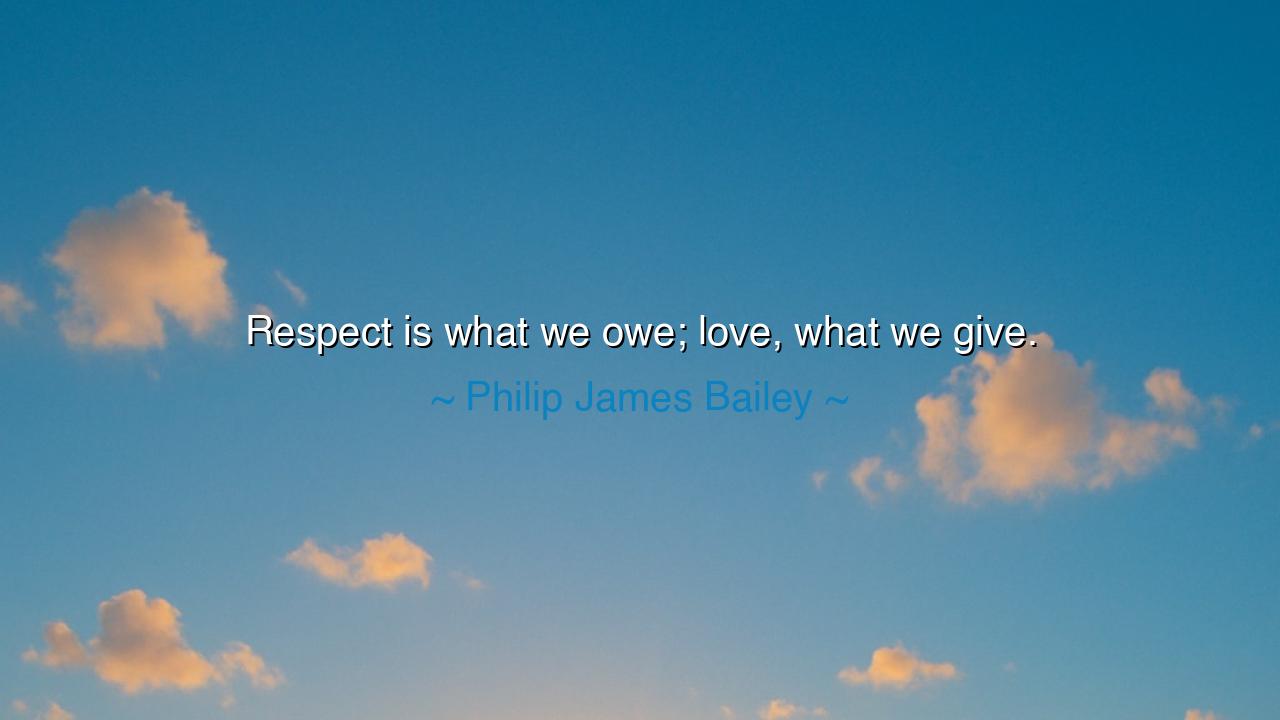
Respect is what we owe; love, what we give.






"Respect is what we owe; love, what we give." So spoke Philip James Bailey, a poet whose words pulse with ancient wisdom, for this saying echoes through the ages, carrying with it the weight of truths known to the sages and the wise. In these words, there lies a powerful distinction between respect and love — two forces that move the human heart but are often confused with one another. Respect is owed to all, regardless of their standing or merit; it is the foundation upon which we build civilized society. But love is a gift — a gift that cannot be demanded, but must be freely offered, a treasure from the heart given with generosity and without expectation.
In the ancient world, the Greeks were no strangers to the delicate dance between these two forces. To them, respect was embodied in the concept of philia, a deep and abiding love between friends or equals, rooted in mutual respect and honor. It was a bond based on shared values and recognition of each other’s worth. But they also knew that love — or agape — was something far more selfless and transcendent, something that was not bound by law or social duty, but was given freely from the soul. Love was divine, unearned, and unrequited — it was not transactional, but sacrificial. To respect was a moral obligation; to love was a divine act.
Let us think of the Roman emperor, Marcus Aurelius, whose heart was guided by the principles of Stoic philosophy. He respected his people, his family, and the empire he ruled, but it was through the act of love that he held his duty with grace. He loved his soldiers, not with the passionate love of a conqueror, but with the compassion of a leader who knew that his greatness lay not in his power, but in the service he rendered to others. His respect for them was shown in the discipline he demanded of himself, and his love for them was reflected in the care he gave to ensure their well-being. Marcus Aurelius understood that respect is a natural duty, but that love — that divine essence — must be given freely, from a place of kindness and compassion.
Yet too often in our lives, we see the confusion between these two words. People will demand respect as though it is a commodity to be bartered, and love will be treated as a mere transaction, given only when returned. This misunderstanding causes great pain, for it leads us to believe that respect and love are both owed in the same way. But respect is the currency of social order — it is a fundamental aspect of human dignity. We owe it to others because they, like us, are human beings worthy of recognition. Yet, love is not something that can be demanded; it must be freely given, without expectation or condition. Love is not transactional; it is sacrificial and pure, flowing from the heart as a stream from the mountain, not bound by the rules of exchange.
Consider the story of Nelson Mandela, who, after being imprisoned for decades, did not emerge with hatred or a thirst for vengeance. Instead, he chose to love his fellow countrymen, including those who had once imprisoned him. His respect for the humanity of others — even those who had wronged him — was clear, but it was his ability to love that transformed his nation. Mandela understood that respect is owed to all people, regardless of their past actions, but it is love that creates unity and brings forth lasting change. His forgiveness and compassion were the gifts he gave, without demand, and in doing so, he healed not only himself but an entire nation. He gave love freely, as a sacrifice to the greater good, knowing that only through love could true peace be achieved.
The lesson in Bailey’s words is clear: respect is a fundamental right, given to every person simply by virtue of their humanity. It is the duty we owe to one another, an obligation to uphold the dignity and honor of those with whom we share this world. But love, that higher, purer force, is freely given. It is an offering from the heart, not something that can be demanded or earned through any act. Love is an act of generosity, given without condition, and in giving it, we bring the highest good into the world.
Therefore, my children, know this: Respect all people, for they are worthy of it by their very nature. Treat them with dignity, with honor, and with fairness, for this is your duty as a fellow human being. But love those who cross your path not because they deserve it, but because your heart is open, and love, in its truest form, is a gift you give freely. Let your love be a sacrifice to the world, a force of healing and transformation. In doing so, you will create a world where respect and love are woven together in a sacred tapestry, binding all souls to one another in unity.






AAdministratorAdministrator
Welcome, honored guests. Please leave a comment, we will respond soon